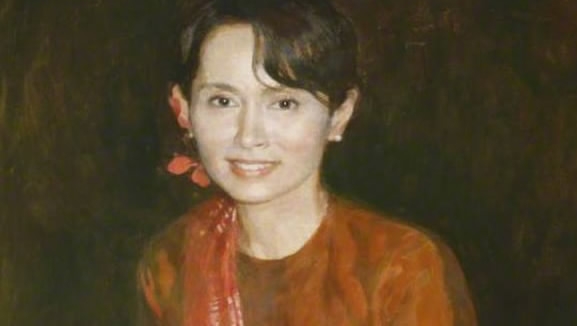
World
22:15, 28-Sep-2017
Suu Kyi's Oxford alma mater removes her portrait from campus
CGTN

The Oxford college, which is Aung San Suu Kyi's alma mater, has removed the Nobel laureate's portrait from public display, following international criticism over her role in Myanmar’s ongoing humanitarian crisis.
The governing body of St Hugh’s College decided to remove the painting from its main entrance on Thursday, the college said in a student newsletter.
Suu Kyi's portrait has been stored and replaced by a Japanese painting, the college said, but it didn’t confirm whether the move is linked to the ongoing Rohingya crisis.
The painting belonged to Suu Kyi’s husband, the Oxford academic Michael Aris, and was bequeathed to St Hugh’s after his death in 1999.
Meanwhile, over 60 Rohingyas were killed when a boat carrying Myanmar refugees capsized off Bangladesh on Thursday.

People watch funeral of Rohingya refugees, who died after their boat capsized, behind Inani Beach near Cox's Bazar, Bangladesh, on September 29, 2017. /Reuters Photo
People watch funeral of Rohingya refugees, who died after their boat capsized, behind Inani Beach near Cox's Bazar, Bangladesh, on September 29, 2017. /Reuters Photo
The bodies of 23 people have been retrieved so far but the death toll is expected to surge to around 60, with many of the dead likely to be young children too weak to swim through the churning water. Seventeen have reportedly survived.
"Forty are missing and presumed drowned," International Organization for Migration spokesman Joel Millman told reporters in Geneva.
Refugees on Friday held funerals for loved ones – among them children – who had hoped to find sanctuary from violence that has cut through their homeland in Rakhine state.
A surge in the numbers of Rohingya fleeing the Myanmar military campaign has taken the total number of refugees in Bangladesh to more than half a million.
A spokesman for the UN refugee agency said a fifth of new arrivals were suffering from acute malnutrition.
The Bangladeshi Red Crescent said its clinics were treating increasing numbers of people with acute diarrhoea. The World Health Organization has said one of the diseases it is particularly worried about is cholera.
‘Brutal campaign’
International anger over the crisis is growing.
In New York, US Ambassador to the United Nations Nikki Haley called on countries to suspend providing weapons to Myanmar over the violence.
It was the first time the US had called for punishment of Myanmar's military, but she stopped short of threatening to re-impose US sanctions which were suspended under the Obama administration.

A Rohingya refugee stands beside the remains of his father, whose family says he succumbed to injuries inflicted by the Myanmar Army before their arrival, in Cox's Bazar, Bangladesh, on September 29, 2017. /Reuters Photo
A Rohingya refugee stands beside the remains of his father, whose family says he succumbed to injuries inflicted by the Myanmar Army before their arrival, in Cox's Bazar, Bangladesh, on September 29, 2017. /Reuters Photo
"We cannot be afraid to call the actions of the Burmese authorities what they appear to be – a brutal, sustained campaign to cleanse the country of an ethnic minority," Haley told the UN Security Council.
Buddhist-majority Myanmar rejects accusations of ethnic cleansing and crimes against humanity and has denounced rights abuses.
UN Secretary-General Antonio Guterres told the Security Council the violence had spiraled into the "world's fastest-developing refugee emergency, a humanitarian and human rights nightmare."
Related story:
Source(s): Reuters

SITEMAP
Copyright © 2018 CGTN. Beijing ICP prepared NO.16065310-3
Copyright © 2018 CGTN. Beijing ICP prepared NO.16065310-3